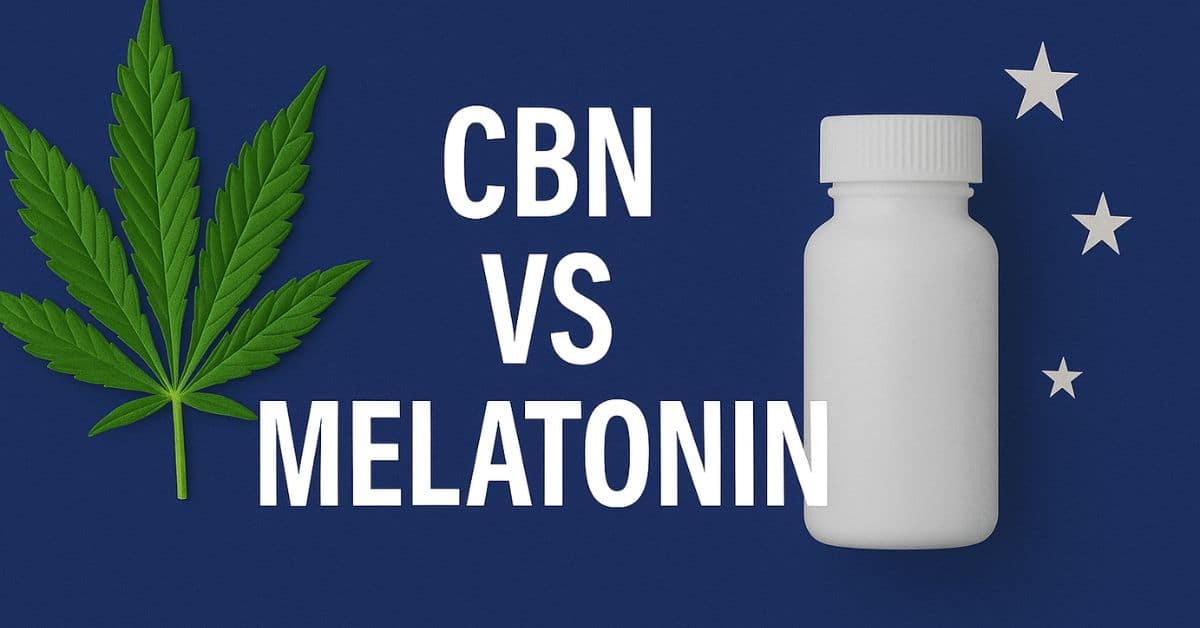Struggling to get a good night’s rest? You’ve likely come across melatonin, the popular over-the-counter sleep aid. But there’s a new natural option gaining attention: CBN.
In this post, we’ll break down the differences between CBN and melatonin, how each works, and which might be the better choice for your sleep needs.
What Is CBN?
CBN (cannabinol) is a non-intoxicating cannabinoid found in aged cannabis and hemp. It’s often promoted for its calming effects and potential to support deeper, longer sleep. Unlike THC, CBN won’t get you high, but it may help you feel more relaxed before bed.
What Is Melatonin
Melatonin is a hormone your brain produces naturally in response to darkness. It plays a key role in regulating your sleep-wake cycle (circadian rhythm). Melatonin supplements are widely used for occasional sleep issues, like jet lag or shift work.
How CBN Helps With Sleep
CBN works by interacting with the body’s endocannabinoid system, a network of receptors that influence sleep, mood, and pain. While research is still in its early stages, many users report feeling more relaxed and staying asleep longer when taking CBN before bed.
Related: What are CB1 and CB2 Receptors?
How Melatonin Helps With Sleep
Melatonin supplements are designed to boost your body’s natural melatonin levels. They’re especially helpful if your internal clock is off, such as after flying across time zones or working overnight shifts. Melatonin usually kicks in within 30 minutes and signals your brain it’s time to rest.
Key Differences Between CBN and Melatonin
Mechanism: CBN supports sleep by calming the nervous system via cannabinoid receptors. Melatonin directly influences the body’s internal clock.
Effectiveness: Melatonin may help you fall asleep faster, while CBN may help you stay asleep longer.
Tolerance: Regular melatonin use may lead to reduced effectiveness. CBN users generally report fewer issues with tolerance buildup.
Side Effects: Melatonin can cause grogginess or vivid dreams. CBN tends to have milder side effects like drowsiness or dry mouth.
Can You Take CBN and Melatonin Together?
Yes, many sleep products now combine CBN and melatonin to promote both faster sleep onset and deeper rest. If you’re considering a combo, start with low doses and monitor how your body responds. Always check with your doctor if you’re on other medications.
Which One Should You Choose?
Choose melatonin if you need a short-term fix for jet lag or shift work.
Choose CBN if you want a more holistic option that supports restful, uninterrupted sleep.
Try both if you want the benefits of quicker sleep onset and improved sleep quality.
Bottom Line
Melatonin is great for adjusting your sleep schedule, but it may not work for everyone long term. CBN offers a natural, non-intoxicating alternative that may help you feel sleepy and stay asleep throughout the night. If you’re looking for a gentle, plant-based sleep solution, CBN might be worth a try.
FAQ
It depends on your sleep needs. Melatonin is best for adjusting your sleep schedule or falling asleep faster, especially short-term. CBN may be better for staying asleep longer and supporting overall relaxation without grogginess.
Yes, you can take CBN and melatonin together. Many sleep formulas combine both to help you fall asleep quickly and stay asleep longer. Start with low doses to see how your body responds.
Most users report that CBN does not cause next-day drowsiness or grogginess, especially when compared to melatonin. It’s often praised for promoting deeper sleep without the “sleep hangover.”
CBN typically begins working within 30 to 90 minutes, depending on the dosage and delivery method (e.g., gummies, oil, capsules). Effects may vary between individuals.

